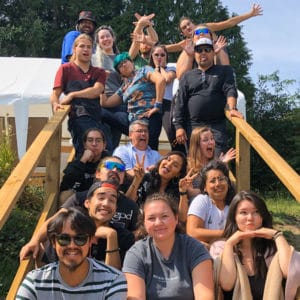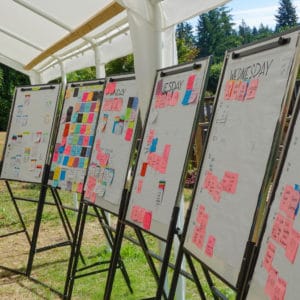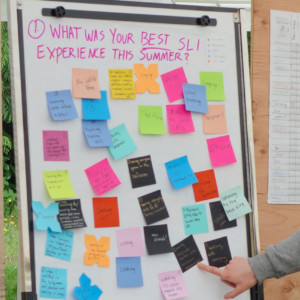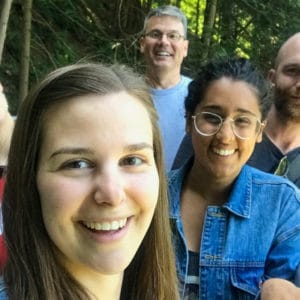 What you can expect as an intern:
What you can expect as an intern:
You will learn how to use WAYK.
One of the main purposes of the WAYK Summer Intensive is to provide comprehensive training in WAYK skills, something that is difficult to demonstrate or even explain in a week-long workshop or a few language lessons. Communities that invite WAYK for a Summer Intensive are actively seeking a more in-depth understanding of the method. All members of a Summer Intensive team, including WAYK interns, will learn about WAYK techniques and how to wield them well in a variety of language learning and teaching situations. Interns also learn how to use the project management tools that WAYK employs to keep projects running smoothly.
You will practice learning new languages through immersion.
One of the most critical skills that WAYK interns will learn how to acquire language through immersion interactions with fluent speakers (or sometimes just speakers that are more fluent than you are). WAYK interns are very valuable to host communities as a support for local language workers who are also learning this skill. Additionally, since many of our program participants know multiple languages, a frequent activity during our downtime is practicing using WAYK techniques to learn languages from each other. We strongly encourage WAYK interns to practice “language hunting” from each other at the WAYK house, since sometimes access to fluent speakers of our focus language can be limited and we prioritize access for members of the local team.
You will teach language lessons before you are fluent in the language.
A key to WAYK’s philosophy is that WAYK training prepares players to teach confidently what they know regardless of their overall level of fluency. As a member of the WAYK team, interns will practice and hone this skill by using WAYK Techniques to teach the Unangam Tunuu they are learning to other members of the Summer Intensive team. It is extremely helpful for all interns to teach in order to solidify their own knowledge, but, more than that, teaching is a necessary part of creating and testing lessons and enhancing the overall efficiency and effectiveness of the WAYK team. Over the course of the summer, we will also spend time practicing lesson/curriculum design and development. Developing good teaching strategies that support student success is a huge part of what we do.
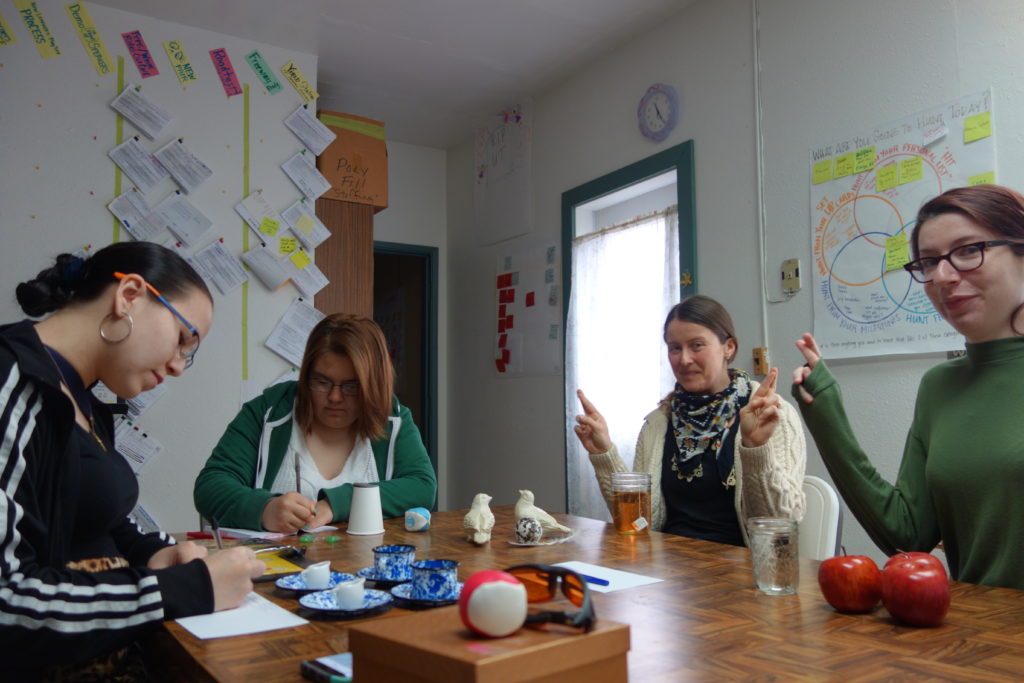
You will write about and share your experiences.
Each summer, we ask our interns to write about their experiences in blog posts that we share on the WAYK website. Because language revitalization field work and WAYK itself can be hard to summarize and explain, we rely on interns’ reflections to give our readers a sense of what a Summer Intensive (or any language revitalization program) is like. In addition to their introduction, we ask our interns to write at least one blog post every week and one in the fall (November 2018) after their internship is complete. These posts will be posted not just during the summer, but throughout the following academic year. Additionally, all interns are expected to sign a media release. Tons of photos and video gets produced during the summer and all of this media is an extremely useful resource for WAYK as well as the host community.
You will work hard.
Taking on a WAYK internship is a considerable endeavor. In one summer, our interns learn WAYK skills, a new language, pedagogical strategies, and how to use project management tools. Due to the nature of language learning and language revitalization projects, a significant time commitment is required. We ask that interns do not bring additional (outside) projects with them to complete during the Summer Intensive. To make worthwhile progress toward our summer goals, participants need immersion exposure to the language on a daily basis for as many weeks as possible. This summer WAYK interns will work with the language team and speakers from 8:30 am – 4:30 pm, five days a week, for 11 weeks. Additionally, interns are responsible for attending meetings at the WAYK house, working in pairs to prepare meals for the WAYK team, and completing household tasks on a rotating schedule. Our daily schedule may shift to include evening and weekend visits with fluent speakers and other events, but typically at least one weekend day is be reserved for downtime, “life maintenance” (laundry, grocery shopping, etc.), team adventures, and learning languages from each other!
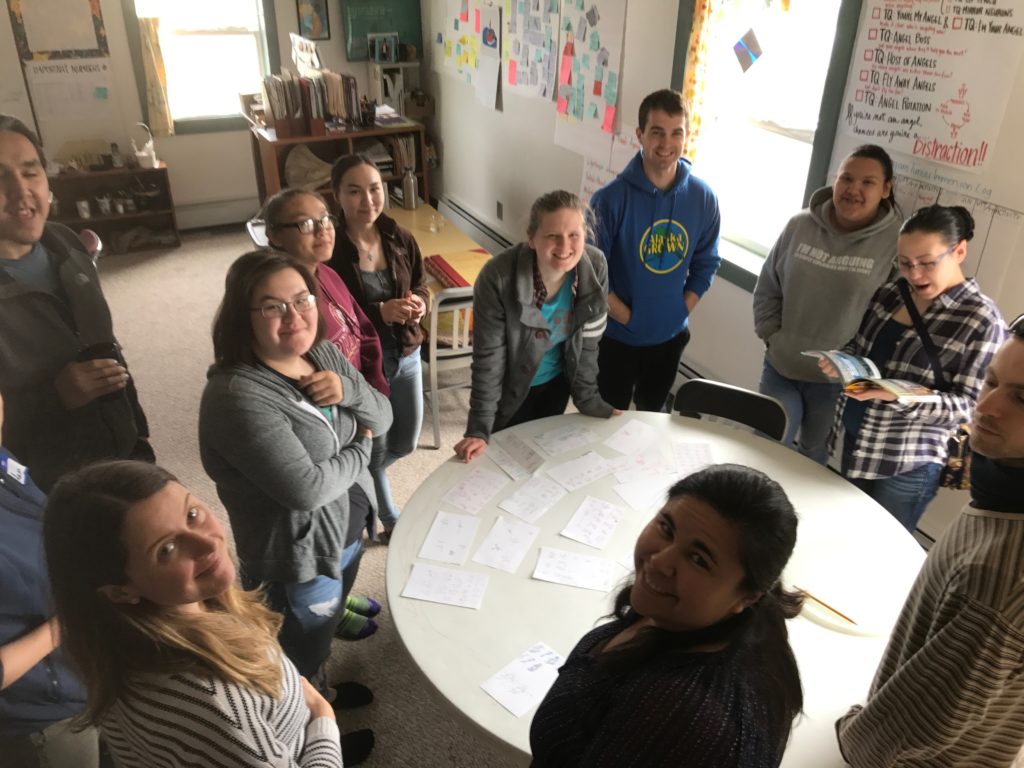
You will get Full!
Working on a language revitalization project can be both an incredibly fulfilling and an incredibly frustrating experience. Participants can get Full for many reasons: being away from home and family, being in an unfamiliar place, living in close quarters with the rest of the team, learning in a way that’s different from what they’re used to, feeling tired, hungry, overwhelmed, etc. Part of our work this summer is developing each person’s ability to tell when they themselves are Full or when others around them are Full. As a team, we will work together to try and keep our Full levels as low as possible. Managing everyone’s Full levels is another reason why we ask that interns not bring extra projects with them to the Summer Intensive.
You will have a fun, unforgettable experience.
A language learning experience like a WAYK Summer Intensive is certainly hard work, but it’s also so much fun. You might be surprised at the great friendships that come out of a shared experience like this one. You will get to learn and play with the WAYK method, give feedback, and help make our work even more effective in the future. And you will contribute to strengthening an endangered language and supporting new speakers, which, if you ask us, is one of the best ways to spend a summer!
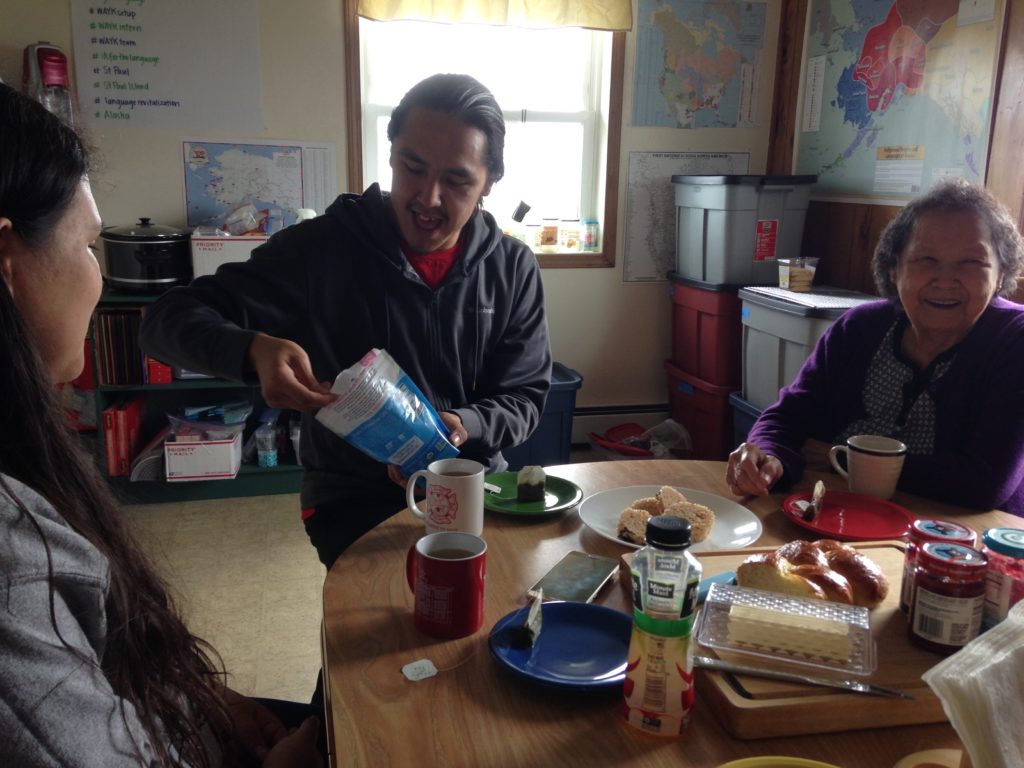
What WAYK expects from you:
You will share space thoughtfully and contribute to the collective comfort of the team.
This summer the entire WAYK team will be sharing living space and working space in Anchorage. Spending the summer in close quarters is great for language learning, WAYK skill-building, and strategizing, but it means that everyone needs to be especially aware of their conduct and how it affects the group. It will also take our collective effort to make sure both the house and the language team headquarters run smoothly and are free of avoidable drama. To that end:
- Not only will the WAYK house be a “dry house” (i.e., no drugs or alcohol will be allowed on the premises) but we ask our interns to commit to a “dry summer.” This is a hard and fast rule that we expect everyone to adhere to.
- New romantic relationships between members of the team or between the WAYK team and members of the host community are strongly discouraged. We’ve learned from experience: If it’s a good idea now, it’ll be a great idea later! (Wait until later!)
- We expect all participants to share responsibilities when it comes to cooking, cleaning, and chores. We will provide a schedule for cooking, cleaning, etc.
- We cannot guarantee that WAYK team members will have their own rooms. This summer, we will be housed in dorms on the University of Alaska Anchorage campus, but this living space will require some team members to be roommates. Whether participants are sharing a room or not, we expect everyone to be respectful of shared space, quiet hours, and the “Meadow.”
- No visitors will be allowed during the Summer Intensive. Our schedule and housing in Anchorage will not permit us to accommodate visitors (friends or family) during the project.
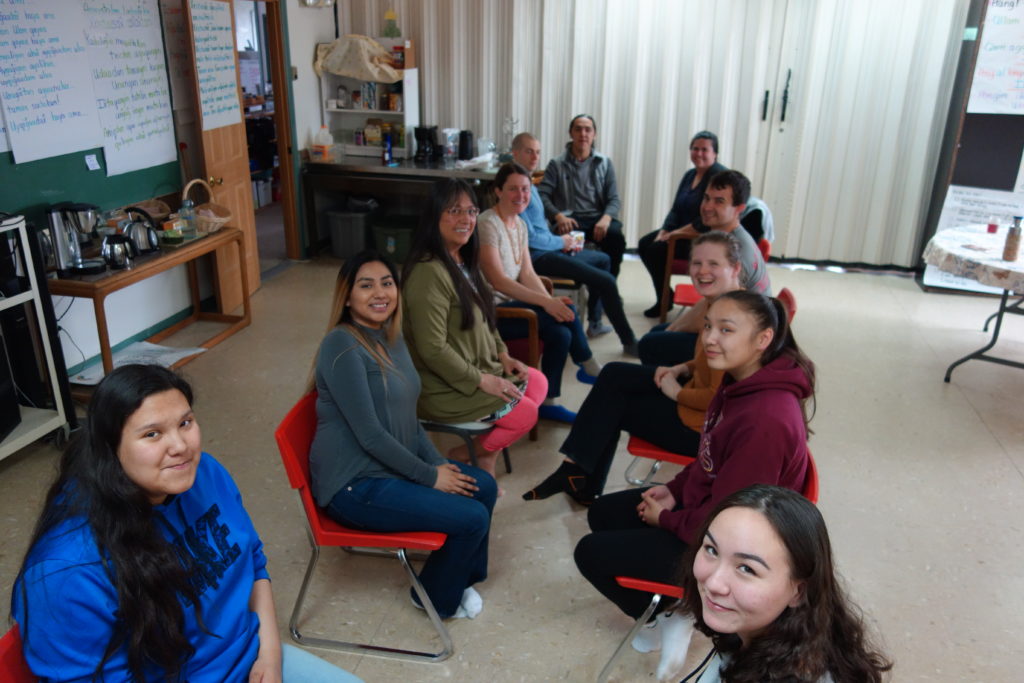
You will be a model for other members of the team.
As mentioned above, one of the most valuable things a WAYK intern can provide to the host community is support for their local learners. Many of these learners are young people (often teenagers), most of whom have not been involved in a project like this before, and some of whom might be working with the language as their very first job. With this in mind, it is important that more experienced members of the team, including the WAYK interns, model positive attitudes and behaviors for other participants. We expect that WAYK interns enthusiastically model basic employability skills (being present and on time, being focused and productive, communicating clearly, taking initiative even when tasks are small or routine, being reliable and responsible, etc.), but beyond that we ask our interns to lead by example in more subtle ways: helping the whole group stay on task and on schedule, helping others become comfortable leading, encouraging confidence and fearlessness in language sessions, helping others adapt to changing circumstances without losing momentum, being patient and persevering (even in times of frustration), interpreting others’ words and actions generously (i.e., assuming the best of intentions), practicing self-reflection and accepting feedback graciously, being comfortable with not knowing everything and asking others for help, and consistently working to make our whole team more effective, cohesive, and amazing.
You will prioritize the language goals of the community above your own personal language goals. We expect that your primary goal is NOT to get fluent in the language.
While interns who spend an entire summer working with Unangam Tunuu will undoubtedly reach some level of proficiency in the language, we need to be clear that this is really a means to an end. At WAYK we have an anti-TQ (i.e., a behavior to avoid) called “Trophy Hunting,” which refers to the idea of people learning another language just for the sake of saying they are fluent in it. There are lots of people who can speak a ridiculous number of languages but have never used their knowledge to create another fluent speaker.
Our mission is entirely different. We have been invited to support the local and regional language team in their quest for fluency, in an effort to build further language learning and teaching capacity in the region. In short: it’s not about us.
This can be especially difficult because often the people who make great WAYK interns (outsiders without an emotional connection to the language, who have experience learning multiple languages already) will be able to learn a new language very easily and quickly. But even if someone has the ability to learn a language quickly, it doesn’t always mean that they should. For us, it’s more important to support local learners who might be inhibited by the pressure they feel to become fluent. When revitalizing a language it’s important to create new speakers, but equally important that those new speakers are part of a local, sustained effort to keep the language vital.
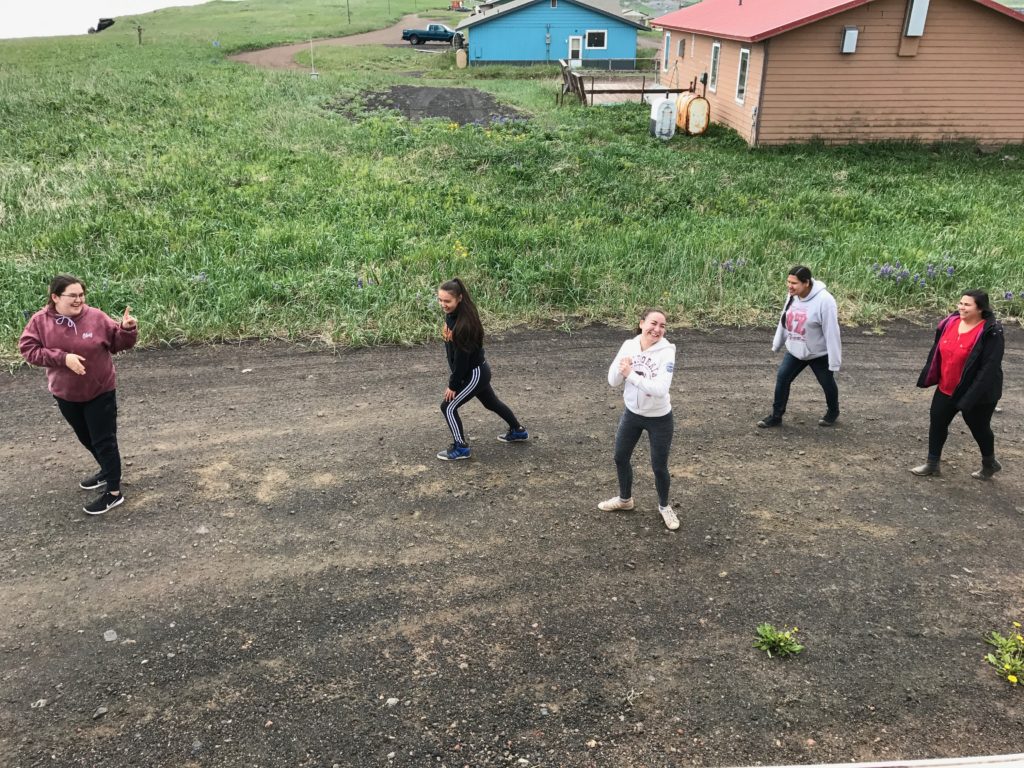
You will NOT engage in behavior that could be distracting or detrimental to the project.
It is hard to anticipate what exact behavior will become problematic in the future. But we can say that we will be visitors in the community, and we don’t want to wear out our welcome. Ongoing discussions of cultural protocol and our relationship with the community will be included in the orientation and throughout the project. In the meantime, here are a few examples:
- This is not the time or venue to debate political issues such as climate change, offshore drilling, marriage equality, or the legalization of marijuana. While we all may feel passionate about these issues, publicizing our feelings may distract from our primary focus. Our job is to get the community fluent enough to have such discussions in the language after we’ve left.
- We need to be mindful about publicizing the language and the project through social media or other means without explicit permission from community members.
- We also need to avoid making the assumption that everyone should feel obligated to learn their heritage language. Many people don’t, and it’s not our job to judge or argue with them.
Please note: Although interns are volunteering their time, the host community will be paying for transportation, lodging, and food. This amounts to thousands of dollars per intern for the summer. Additionally, the conduct of the WAYK interns reflects on our organization and can affect our relationships with future partner communities. Because of this, all WAYK interns will be held to the highest standards of integrity and trust. As a team, our first priority must be to the language and the host community, and if there is a situation where this priority is not respected, it is possible that a participant will be asked to leave the program early, no questions asked.
We hope that gives you a sense of what to expect if you’re considering a summer internship with WAYK. If you have further questions, check out information about the summer project, internships, our schedule, and some FAQs about interning with WAYK. You can also email us. Click here to start your application.

